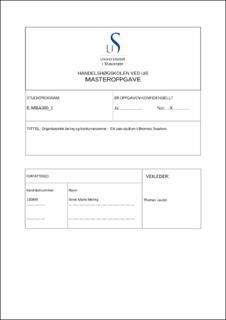| dc.contributor.advisor | Laudal, Thomas | |
| dc.contributor.author | Meling, Anne Marie | |
| dc.date.accessioned | 2022-06-23T15:51:39Z | |
| dc.date.available | 2022-06-23T15:51:39Z | |
| dc.date.issued | 2021 | |
| dc.identifier | no.uis:inspera:81575038:88699605 | |
| dc.identifier.uri | https://hdl.handle.net/11250/3000327 | |
| dc.description.abstract | Norsk havbruk har hatt ein eksepsjonell vekst dei siste tiåra, og enno har bransjen stort vekstpotensiale, men næringa står samtidig ovanfor vesentlege utfordringar for at den skal kunne vekse på ein produktiv og berekraftig måte. Det er vidare ein gjennomgåande høg grad av vertikal integrasjon i næringa, der verdikjedane ofte er komplekse og med til tider motstridande prioriteringar mellom dei ulike ledda innanfor dei organisatoriske grensene. Med dette som bakteppe har oppgåva hatt som formål å studere korleis bedrifter i ein bransje prega av kompleksitet utanfor og innanfor organisatoriske grenser får til læring på tvers av grensesnitta i verdikjeda, og om denne læringa kan bidra til auka konkurranseevne. For å adressere dette temaet er følgjande problemstilling lagt til grunn: Korleis fungerer organisatorisk læring i vertikalt integrerte bedrifter, og kan denne læringa bidra til konkurransefortrinn?
For å svare på oppgåvas problemstilling er det utført ein kvalitativ case-studie av Bremnes Seashore, eit privateigd oppdrettsselskap med fullintegrert verdikjede. Datainnsamling har føregått gjennom forskingsintervju med informantar frå dei ulike ledda i verdikjeda.
Resultata viser at det føregår læring på kvalitative ulike læringsnivå, alt ifrå trinnvise forbetringar til omfattande strukturell læring. Den organisatoriske læringa kjem som følgje av målretta systematisk arbeid, men også frå meir tilfeldig kunnskapsdeling, erfaringsutveksling og problemløysing. Funna viser at organisatorisk læring kan koplast direkte til bedriftas konkurranseevne, men dei viser også korleis dynamikken mellom dei ulike grensesnitta i ei kompleks verdikjede kan utgjere barrierar for å effektivt utnytte potensialet i bedriftas interne ressursar. Auka tilrettelegging av formelle og uformelle samhandlingsmekanismar vil såleis ytterlegare styrke organisasjonens læringsevne, som igjen vil kunne bidra til auka konkurranseevne. | |
| dc.description.abstract | Norwegian aquaculture has experienced exceptional growth in recent decades, and the industry still has great growth potential; at the same time the industry faces significant challenges in order to grow in a productive and sustainable manner. There is also a generally high degree of vertical integration in the industry, where the value chains are often complex and with sometimes divergent priorities between the various functions within the organization. This paper has therefore aimed to study how companies in an industry characterized by complexity, within as well as outside organizational boundaries, learns across the interfaces within the value chain, and whether this learning can contribute to increased competitiveness. To address this topic, the following thesis question has been applied: How does organizational learning take place in vertically integrated companies, and can this learning contribute to a competitive advantage?
To answer the thesis question, a qualitative case study has been carried out in Bremnes Seashore, a privately owned aquaculture company with a fully integrated value chain. Data collection has taken place through research interviews with informants across functions in the value chain.
The results show that learning takes place at qualitatively different levels of learning, ranging from step-by-step improvements to comprehensive structural learning. Organizational learning comes as a result of targeted systematic work, but also from more casual knowledge sharing and problem solving. The findings show that organizational learning can be directly linked to the company's competitiveness, but the results also show how the dynamics between various interfaces in a complex value chain can constitute barriers to effectively exploiting the potential of the company's internal resources. Increased facilitation of formal and informal social interaction mechanisms will thus further strengthen the organization's learning ability, which in turn could contribute to increased competitiveness. | |
| dc.language | nno | |
| dc.publisher | uis | |
| dc.title | Organisatorisk læring og konkurranseevne - Eit case-studium i Bremnes Seashore | |
| dc.type | Master thesis | |
